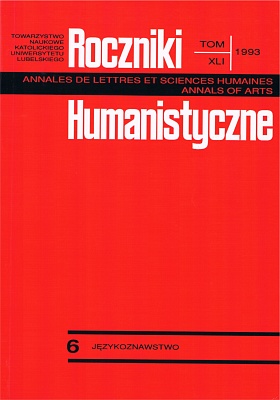W sprawie XVI-wiecznej normy polskiego języka literackiego na przykładzie kontynuantów grupy *źŕ
Abstrakt
The author takes up the problem of the norm of the Polish literary language in the period of the Renaissance. We find the instances of the continuants of the *źŕ group in the prints written by the authors from Great Poland, Masovia and Little Poland. They are also in prints edited outside Krakow (in Poznań, Vilnius, Nieśwież and Brześć Litewski). In keeping with the above-mentioned examples we can say that in the second half of the sixteenth century there was a variety of the Polish literary language due to various regions. For example, in Great Poland and Masovia the continuant of the *źŕ group in medial position was the -jrz- group. In Little Poland, however, if we can rely on the testimony of the Radziwiłł Bible, there was the -jzr- (-jźr-) group. The -jzr- has been regarded by the historians of the language as something exceptional, which is confirmed with hundreds of instances in the Radziwiłł Bible from Little Poland. This fact deserves particular attention and a more thorough study.
The regional variety of the literary language in the second half of the sixteenth century is not confirmed by the "Krakow prints", the works published in Krakow. The authors (who came from various regions) printed the majority of their works just in Krakow. In this manner, one may conclude that the Polish literary language of that time bore a uniform character as regards its grammar. When we confront, however, these works with those printed outside Krakow, we find that there is a clear difference.
Copyright (c) 1993 Roczniki Humanistyczne

Utwór dostępny jest na licencji Creative Commons Uznanie autorstwa – Użycie niekomercyjne – Bez utworów zależnych 4.0 Międzynarodowe.





